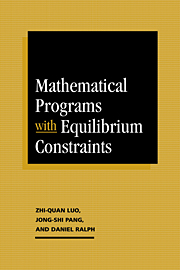Preface
Published online by Cambridge University Press: 05 December 2011
Summary
This monograph deals with a class of constrained optimization problems which we call Mathematical Programs with Equilibrium Constraints, or simply, MPECs. Briefly, an MPEC is an optimization problem in which the essential constraints are defined by a parametric variational inequality or complementarity system. The terminology, MPEC, is believed to have been coined in [108]; the word “equilibrium” is adopted because the variational inequality constraints of the MPEC typically model certain equilibrium phenomena that arise from engineering and economic applications. The class of MPECs is an extension of the class of bilevel programs, also known as mathematical programs with optimization constraints, which was introduced in the operations research literature in the early 1970s by Bracken and McGill in a series of papers [34, 36, 37]. The MPEC is closely related to the economic problem of Stackelberg game [265] the origin of which predates the work of Bracken and McGill.
Our motivation for writing this monograph on MPEC stems from the practical significance of this class of mathematical programs and the lack of a solid basis for the treatment of these problems. Although there is a substantial amount of previous research on special cases of MPEC, no existing work provides such generality, depth, and rigor as the present study. Our intention in this monograph is to establish a sound foundation for MPEC that we hope will inspire further applications and research on this important problem.
This monograph consists of six chapters. Chapter 1 defines the MPEC, gives a brief description of several source problems, and presents various equivalent formulations of the equilibrium constraints in MPEC; the chapter concludes with some results of existence of optimal solutions.
Information
- Type
- Chapter
- Information
- Mathematical Programs with Equilibrium Constraints , pp. xxi - xxivPublisher: Cambridge University PressPrint publication year: 1996
